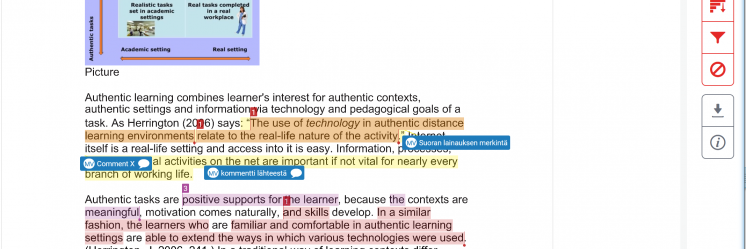Using MyCourses discussion forum as a peer assessment and feedback tool

It was one eye-opening discussion with a colleague over an afternoon coffee that got me thinking. I remember from the previous year’s teaching, how challenging it was to support community building in an online environment. For this upcoming course, I decided to focus on designing course activities that would get students to interact more with each other. But how could I connect this objective to assignments and assessment?
Now that we are experienced with online teaching, it is easier to try out some new methods for student activation. If designed carefully, besides course content, these activities could teach the students important skills for academic discussion tradition, like peer review, argumentation, and giving and receiving feedback.
As a teacher, I do not wish for the students to merely learn things by heart for a final exam, but to introduce them to critical thinking as well as to teach them to formulate their thoughts into arguments. But how could I encourage this kind of learning path as a teacher?
For the next course implementation, I am going to have the students to engage in more in-depth discussions with each other. I will do this through carefully designed assignments that reach out from content learning to discussions and critical thinking. As a tool, I will use the MyCourses discussion forum activity for peer feedback and assessment.
What do I need to consider while giving the discussion assignment?
- Think through your own objectives for the assignment
Peer assessment and discussion are especially valuable when the study content requires deep and philosophical thinking. Examples of this could be literacy reviews or discussions on a single article, analysis exercises, observation tasks, design prototypes, artwork, or doing background research for a topic or a visiting lecture.
In general, a discussion is essential for connecting the course content to the broader professional scene. It is also necessary for developing ideas and processes. The assignment can be arranged as a group or an individual task.
- Communicate clearly what is expected
Are there assigned opponents or can the students choose freely which line of discussion they join in? For example: Make one post by Tuesday and give peer feedback for two posts by the following Friday.
Also, communicate how the discussion assignment is impacting the course assessment. Communicate the weight of it and what kind of participation and contribution is required and valued. How is this monitored?
- Teach students to give and receive constructive feedback
Focusing on a given topic and ethical considerations are important. Discuss with the students about the ethics and skills of giving and receiving feedback. When giving feedback, they are not allowed to go into offensive remarks and the writing style should be encouraging. The art of argumentation is a skill to be learned and critical statements are to be grounded with references, not opinions.
Also, teach that receiving critical feedback and defending one’s own work is an essential part of academic discussion culture. Critical notions are there to be reflected upon and learned from, not to get offended by. In academic discussion culture, debate is a tradition. Peer review is an established academic method for quality control. It is also important to learn how to defend your own work based on references, not personal opinions.
- If possible, take part in discussions.
It is important for a teacher to follow up or participate in the discussions, at least if the group size enables this. The method is easiest for a teacher to follow with small or mid-sized groups. With big classes, the discussions can be between study groups rather than individuals, and student assistants can be used to facilitate discussion and follow up on the content.
Correct misunderstandings, give tips for materials or methods. Checking the quality of discussion is the teacher’s responsibility. When engaging as a teacher in discussions, it is essential to be even-handed and to equally engage in every discussion.
What is it not good for?
This method is not for deeply personal discussions. Tell the students that they have control of what they say, and they are free to make their own decisions on how much of their personal life they wish to share in the open discussion.
Text: Jaana Brinck, LES – Teacher Services
*****************************************************
Wish to have a chat on how to implement the MyCourses discussion forum into your own teaching?
Please contact us at Teacher services and Book your session with a specialist
